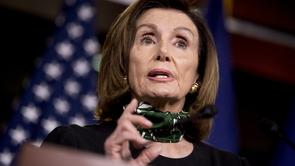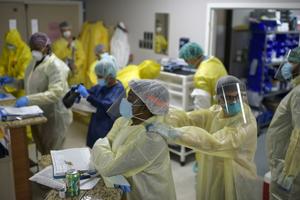 House Speaker Nancy Pelosi of Calif., speaks during a news conference on Capitol Hill, May 14, 2020, in Washington. (ANDREW HARNIK / AP)
House Speaker Nancy Pelosi of Calif., speaks during a news conference on Capitol Hill, May 14, 2020, in Washington. (ANDREW HARNIK / AP)
WASHINGTON - US President Donald Trump's decision to officially quit the World Health Organization (WHO) has sparked outrage among US lawmakers, raising concerns over the ongoing global fight against the COVID-19 pandemic.
The United States will leave the WHO on July 6, 2021, and currently it owes the organization more than US$200 million in assessed contributions, according to the WHO website
US House of Representatives Speaker Nancy Pelosi said on Twitter that Trump's decision was "an act of true senselessness".
Trump made the decision at a time when "the WHO coordinates the global fight against COVID-19," Pelosi wrote on Wednesday.
"With millions of lives at risk, the President is crippling the international effort to defeat the virus," she said.
The United States will leave the WHO on July 6, 2021, and currently it owes the organization more than US$200 million in assessed contributions, according to the WHO website.
The US suffered the most from the pandemic, with 3,054,695 COVID-19 cases and 132,299 fatalities up to date, according to the Center for Systems Science and Engineering at Johns Hopkins University
"To call Trump's response to COVID chaotic and incoherent doesn't do it justice. This won't protect American lives or interests -- it leaves Americans sick and America alone," Senator Robert Menendez, top Democrat on the Foreign Relations Committee, said Wednesday on Twitter.
ALSO READ: WHO warns against politicizing COVID-19
Top Republican Senator Lamar Alexander, chair of the Senate Committee on Health, Education, Labor and Pensions, said he disagreed with the president's decision as it would undermine the development of a COVID-19 vaccine and hamper US cooperation with other countries to curb the spread of the novel coronavirus
"Withdrawing US membership could, among other things, interfere with clinical trials that are essential to the development of vaccines, which citizens of the United States, as well as others in the world, need," said Alexander, the senior Senator from Tennessee.
"If the administration has specific recommendations for reform of the WHO, it should submit those recommendations to Congress, and we can work together to make those happen," he added.
US House Foreign Affairs Committee chair and New York Representative Eliot Engel said deflecting blame “onto the WHO won't reverse the administration's mistakes or undo the suffering our country has endured"
House Foreign Affairs Committee chair and New York Representative Eliot Engel said deflecting blame “onto the WHO won't reverse the administration's mistakes or undo the suffering our country has endured."
"The president needs to get serious about stopping this pandemic's lethal spread by restoring our membership in the WHO, ramping up testing, and encouraging everyone to practice social distancing and wear masks," Engel said.
By withdrawing from the WHO, Trump has further abdicated US global leadership, Congressman Ami Bera, who represents California's 7th Congressional District in the US House of Representatives, lamented on Twitter.
"His go-it-alone approach puts America's health and security at risk," he said Wednesday. Bera, a physician, also told local media that the United States and the WHO had worked "hand in hand" to eradicate smallpox and nearly defeat polio.
"If the WHO is to blame: why has the U.S. been left behind while many countries from South Korea to New Zealand to Vietnam to Germany return to normal?" he said.
ALSO READ: UN: US withdrawal from WHO to take effect July 2021
Eric Swalwell, who represents California's 15th congressional district in the House, said on Twitter that Trump’s decision “is irresponsible, reckless, and utterly incomprehensible.”
“Withdrawing from the @WHO in the midst of the greatest public health crisis of our lifetime is a self-destructive move. More Americans will be hurt by this careless choice," he said.
As global COVID-19 infections top 12 million, with a vaccine still not in sight, Washington's decision was "disastrous" for national interests and the departure would weaken American influence on international health diplomacy, Lawrence O Gostin, the director of the O'Neill Institute for National and Global Health Law at Georgetown University, said in a statement.
"It will make Americans less safe during an unprecedented global health crisis," Gostin added.
 A healthcare worker gives another a shoulder rub before they go back into the the COVID-19 Unit at United Memorial Medical Center in Houston, Texas, July 2, 2020. Despite its renowned medical center with the largest agglomeration of hospitals and research laboratories in the world, Houston is on the verge of being overwhelmed by cases of coronavirus exploding in Texas. (MARK FELIX / AFP)
A healthcare worker gives another a shoulder rub before they go back into the the COVID-19 Unit at United Memorial Medical Center in Houston, Texas, July 2, 2020. Despite its renowned medical center with the largest agglomeration of hospitals and research laboratories in the world, Houston is on the verge of being overwhelmed by cases of coronavirus exploding in Texas. (MARK FELIX / AFP)
Dr Ashish Jha, director of the Harvard Global Health Institute, considered it as "an extraordinarily bad decision that will both harm global public health and harm the health of the American people."
"It's unclear to me how the American people benefit by not being at the table and not being able to shape those policies," the expert was quoted as saying by the New York Times.
Washington's blame on the WHO for not investigating the COVID-19 outbreak in China is "deeply disingenuous," Jha said.
"WHO can't push its way into China, any more than it can investigate why our outbreak is so bad in Arizona or why we're botching the response as badly as we are," he said.
READ MORE: WHO-led coalition needs US$31.3b to fight COVID-19
He also called on the White House to adhere to science, encourage people to wear masks and conduct social distancing.
"There's been a lot of mixed messaging on masks and social distancing and so all of that has contributed to what I think is a perilous moment for our country," Jha said.
Amanda Glassman, a public health expert and executive vice president of the Center for Global Development think tank, noted that the world doesn't just face today's threat of COVID-19 but also the threat of future pandemics, which are more likely because of increased zoonotic transmission.
"Withdrawal is counterintuitive at best and dangerous to human life at worst," Glassman told USA Today. "The US Congress should immediately explore what power it has to prevent this from happening."
She noted that the probability of a high lethality strain of influenza in the next decade or so is also significant, adding that corrective measures at the WHO are needed and member states' staying engaged is necessary.
Gayle Smith, president and CEO of The ONE Campaign, an advocacy group focused on improving global health and eliminating poverty, suggested that the United States should use its influence to strengthen the WHO, "not abandon it at a time when the world needs it most."


